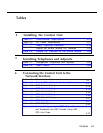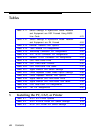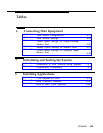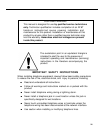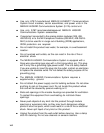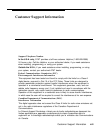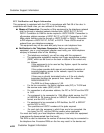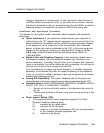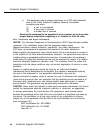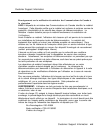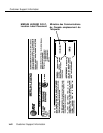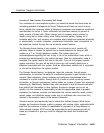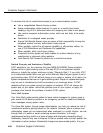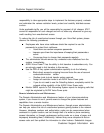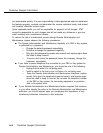
Customer Support Information
ringing in response to an incoming call. In most, but not all, areas the sum of
the RENs should not exceed five (5.0). To be certain of the number of devices
that may be connected to the line, as determined by the total RENs, contact the
telephone company to determine the maximum REN for the calling area.
Installation and Operational Procedures
The manuals for your system contain information about installation and operational
procedures.
■
■
■
■
■
Repair Instructions.
If you experience trouble because your equipment is
malfunctioning, the FCC requires that the equipment not be used and that it be
disconnected from the network until the problem has been corrected. Repairs
to this equipment can be made only by the manufacturers, their authorized
agents, or others who may be authorized by the FCC. In the event repairs are
needed on this equipment, contact your authorized AT&T dealer or,
in the
U.S.A. only,
contact the National Service Assistance Center (NSAC) at
1-800-628-2888.
Rights of the Local Telephone Company.
If this equipment causes harm to
the telephone network, the local telephone company may discontinue your
service temporarily. If possible, they will notify you in advance. But if advance
notice is not practical, you will be notified as soon as possible. You will also be
informed of your right to file a complaint with the FCC.
Your local telephone company may make changes in its facilities, equipment,
operations, or procedures that affect the proper functioning of this equipment.
If they do, you will be notified in advance to give you an opportunity to maintain
uninterrupted telephone service.
Hearing Aid Compatibility.
The custom telephone sets for this system are
compatible with inductively coupled hearing aids as prescribed by the FCC.
Automatic Dialers.
WHEN PROGRAMMING EMERGENCY NUMBERS AND/OR
MAKING TEST CALLS TO EMERGENCY NUMBERS:
— Remain on the line and briefly explain to the dispatcher the reason for
the call.
— Perform such activities in off-peak hours, such as early morning or late
evening.
Direct Inward Dialing (DID).
a. This equipment returns answer supervision signals to the Public
Switched Telephone Network when:
(1)
answered by the called station
(2)
answered by the attendant
(3)
routed to a recorded announcement that can be administered
by the customer premises equipment user
(4)
routed to a dial prompt
Customer Support Information
xix



